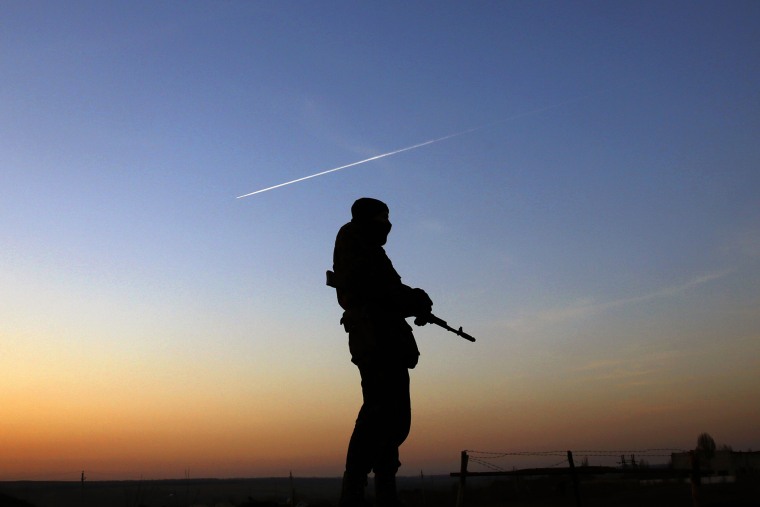The United States and European Union are committed to imposing a cost on Russia for denying sovereignty to Crimea, President Obama said Monday morning.
"Europe and America are united in our support of the Ukrainian government and the Ukrainian people. We are united in imposing a cost on Russia for its actions so far," he said after meeting Monday with Dutch Prime Minister Mark Rutte.
Russian troops continued their moves to control the peninsula throughout the weekend and beginning early this week.
"We both regard Russia's attempt to annex Crimea as a flagrant breach of international law, and we condemn its actions in the strongest possible terms," Rutte said. "The presence of so many world leaders in the Netherlands this week presents an important opportunity for the international community to discuss this subject as well as other pressing issues that affect our common interest."
As the president landed in the Netherlands on Monday ahead of the two-day Nuclear Security Summit, Ukraine's government ordered troops to withdraw from Crimea. The G7 leaders are expected to focus much of their discussions on Ukraine.
Ukrainian Foreign Minister Andrii Deshchytsia said on Sunday that he has serious concerns about the latest buildup of Russian troops along the eastern border of his country and that his forces are “ready to respond” if Moscow makes a decision to invade.
Deshchytsia told ABC’s Martha Raddatz on This Week that the chances of war with Russia are increasing.
“We don’t know what Putin has in his mind and what would be his decision. That’s why the situation is becoming even more explosive than it used to be a week ago,” said Deshchytsia. He added that while the Ukrainian government is trying to use peaceful and diplomatic means to stop the Russians, “the people are also ready to defend their homeland.”
On Saturday, Russian troops reportedly stormed a Ukrainian airbase in Crimea. Interim Ukrainian President Oleksandr Turchynov said one of his air force commanders, Col. Yuliy Mamchur, was “abducted” by Russian forces. It was the last key Ukrainian military facility in Crimea that was turned over to pro-Russian forces.
There are now an estimated 20,000 Russian forces, including infantry, airmen and special operation forces, stationed along Ukraine’s eastern border with Russia. Authorities in several Baltic countries have expressed fear that Moscow’s intentions go well beyond Crimea.
The U.S. and European Union have since imposed sanctions on Russia. Putin has pointed to a recent, controversial referendum, in which Crimea voted overwhelmingly to join Russia and secede from Ukraine. The White House has contended the vote is contrary to Ukraine’s constitution and was administered under threats of intimidation and violence.
House Intelligence Committee Chairman Mike Rogers said on Sunday that the U.S. should send small arms and radio equipment to the Ukrainian army so it can defend itself in the event of an invasion.
“I think that sends a very clear message,” he said on NBC’s Meet The Press. Rogers, who gave the interview from the Georgian capital of Tblisi – a country that Russian forces invaded in 2008 – said both U.S. intelligence officials and Ukraine believe “Putin is not done in Ukraine.”
Democratic Sen. Dick Durbin of Illinois and Republican Sen. Kelly Ayotte of New Hampshire both said they supported sending military aid to Ukraine. Durbin said on Face the Nation that aid could include fuel, tires, sleeping bags, meals, and possibly even small arms. Ayotte suggested in a separate interview on the same show that that communications equipment should be sent and that the U.S. should consider putting in place sanctions on the entire financial sector of the Russian economy.
Meanwhile, former Republican presidential candidate Mitt Romney is blaming President Obama’s “faulty judgment” and “naiveté” for the escalating crisis in Ukraine.
“Unfortunately, not having anticipated Russia’s intentions, the president wasn’t able to shape the kinds of events that may have been able to prevent the kinds of circumstances that you’re seeing in the Ukraine,” Romney said on CBS’ Face The Nation on Sunday.
When host Bob Schieffer noted that Russia’s takeover of the Crimea region in Ukraine caught many by surprise, the former Massachusetts governor said the U.S. should have taken action early on and faulted Obama and former Secretary of State Hillary Clinton’s decision to reset relations with Russia back in 2009.
Romney argued the U.S. could have worked together with its allies as soon as the demonstrations in Ukraine began and communicated potential consequences to Russia before it annexed Crimea.
In the 2012 presidential race, Romney faced plenty of heat from Obama for saying the biggest geopolitical threat facing America was Russia and not Al-Qaeda.
“I think effective leaders typically are able to see the future to a certain degree, and then try to take actions to shape it in some way. And that’s of course what this president has failed to do,” the former governor said.
